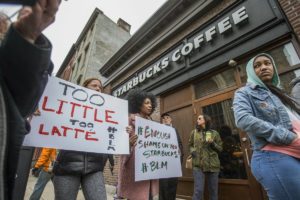After asking to use the bathroom without yet ordering, two black men were arrested for defiant trespassing in a Philadelphia Starbucks on Thursday, April 12. The Starbucks barista called police, despite the men’s explanation that they were waiting for a friend to join them. The friend joined just in time for them to be taken out of the establishment in handcuffs.
Police commissioner Richard Ross, who is reviewing the incident, defended the officers’ actions via Facebook live. Ross did not comment on whether racial bias applied in this case, but made clear that”it is important to emphasize and underscore that these officers had legal standing to make this arrest,” during his live-stream. But why is it important for Ross to emphasize this? Did the officers actually have the legal standing to make an arrest?
4th Amendment Rights and False Arrest
To answer these questions we must look more closely at the 4th Amendment. The 4th Amendment guarantees you protection against unreasonable searches and seizures by the police. The Amendment elaborates that an arrest is reasonable only if there is probable cause. Probable cause means that a reasonable officer could believe that the suspect has committed a crime given the circumstances at the time of arrest. Without probable cause, a police officer does not have the legal authority to arrest and detain you. If an officer arrests you without probable cause, that is a false arrest and they have violated your 4th Amendment rights. You may pursue a false arrest tort, and sue for damages.
The police commissioner makes the claim that officers had the legal authority to arrest the men in Starbucks, because he believes they had probable cause, probably acting on the statements of the barista. However, considering the actions of the men leading to the arrest and at the time of arrest, it is highly suspicious that the officers’ extreme actions were due to racial profiling.
Racial Profiling

Racial profiling is the police action of detaining or arresting a person because of race. This is a discriminatory practice that usually targets African Americans, Latin Americans and Muslim Americans. Racial profiling not only violates your right to be free from unreasonable searches and seizures under the 4th Amendment, but also your Constitutional right to Equal Protection under the law.
The men at Starbucks did not act out of the ordinary–they were simply waiting at the Starbucks to meet a friend. Why then did the barista feel the need to call the authorities? The men remained calm and non-confrontational when the police arrived. The arrival of their friend corroborated their story. Why then did the officers proceed to arrest them despite these facts?
The only reasonable answer in this case is the men’s race. Both the Starbucks employee and the arresting officers racially profiled them.
You were Falsely Arrested. What now?
If you were falsely arrested, you may sue for damages. In determining how much compensation to award juries consider:
- length of time of the confinement;
- treatment by police while confined;
- physical injuries;
- emotional injuries;
- humiliation and shame;
- loss of time and liberty; and
- damage to your personal and professional reputation.
In addition to damages to compensate the victim, punitive damages, damages designed to punish the defendant, may also be available.
A false arrest is an intentional tort. This means the person who committed false arrest has to have done it purposefully. The intent of police officers to enforce laws protecting the welfare, safety, and health of the public is usually clear. However, in certain incidents, like the one that occurred at Starbucks, the intent of the officer can be disputed. It is likely that racial discrimination against the men motivated the arrest. If this is so, officers failed to protect welfare and safety.
The interpretation of these incidents can be varied. While many feel racial discrimination influenced the actions of the officers, others, like Police Commissioner Ross, feel the officers acted legally. So it is important to have a knowledgeable, experienced attorney handling your false arrest cases, especially if racial profiling may have occurred. If you have any questions concerning false arrest or racial profiling, contact our experienced personal injury attorneys by email or by calling (718) 364-4000 for a free consultation. You can also get started by simply filling out one of our case intake forms and we will have one of our attorneys get right back to you.









